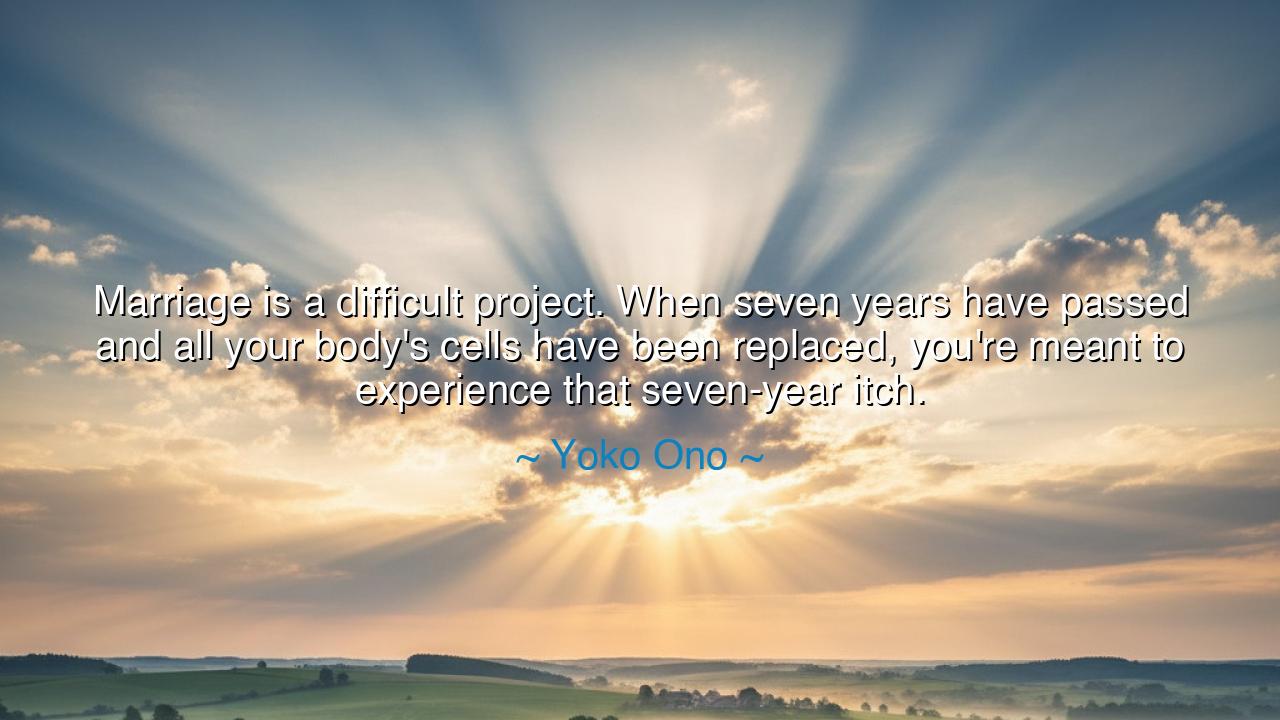
Marriage is a difficult project. When seven years have passed and
Marriage is a difficult project. When seven years have passed and all your body's cells have been replaced, you're meant to experience that seven-year itch.






“Marriage is a difficult project. When seven years have passed and all your body’s cells have been replaced, you’re meant to experience that seven-year itch.” Thus spoke Yoko Ono, artist, poet, and philosopher of the heart, whose words carry both the tenderness of love and the realism of endurance. Her reflection is at once poetic and scientific—a recognition that love, like the body, changes with time. What she calls a “difficult project” is no mere task of convenience, but a lifelong labor of renewal. In her metaphor, marriage is not a static bond, but a living organism, constantly evolving, shedding, and regrowing. Each cell, each habit, each feeling transforms as the years pass, and after seven cycles, when both lovers are physically new beings, they must also decide whether to be spiritually reborn together—or to part ways.
The origin of this wisdom lies partly in nature itself. It is said that every cell in the human body regenerates over the course of seven years, meaning that we are, in some sense, physically remade. Yoko Ono, with the artist’s insight, turns this biological fact into a metaphor for the human soul. If our bodies renew themselves, so too do our hearts, our desires, and our visions of life. The “seven-year itch”, a phrase popularized in psychology and culture, speaks of the restlessness that often arises in long relationships—the yearning for change, for novelty, or for rediscovery. But Ono transforms this phrase from a complaint into a revelation: that such restlessness is not a curse, but a natural stage of transformation. To survive it is to evolve; to resist it is to stagnate.
Yoko Ono herself knew the turbulence of love. Her marriage to John Lennon, one of the world’s most celebrated musicians, was both a union of souls and a test of endurance. They faced storms of fame, criticism, and the pressures of two great spirits living as one. For them, marriage was indeed a “project”—a work of constant creation. Like the art they made together, it required imagination, forgiveness, and the courage to reinvent. When she speaks of the seven-year cycle, she is not warning of decay, but describing the rhythm by which love renews itself—how, after years of intimacy, two people must rediscover one another as if meeting anew.
In the annals of history, the same truth has echoed across centuries. Consider the marriage of Queen Victoria and Prince Albert—a partnership that began in youthful passion and matured into profound devotion. They too faced the trials of change: the burden of empire, the loss of children, the slow erosion of youthful dreams. Yet Victoria wrote of him not as a static ideal, but as a man she loved differently in every season of life. Their love transformed as they did—it deepened, aged, and mellowed like wine. When Albert died, she mourned not only her husband, but the half of her soul that had grown through decades of shared evolution. Her grief was the price of a love that had survived many renewals.
Yoko Ono’s vision, however, carries a deeper wisdom: that marriage is a work of art, not a possession. It must be shaped, challenged, and reimagined through time. The “difficult project” she describes is not a burden, but a calling—to labor with the heart as a sculptor labors with stone, carving away the rough edges of pride and selfishness until something beautiful emerges. Each seven-year cycle is a new canvas upon which love must paint itself again. Those who succeed are not those who cling to the old form, but those who dare to create anew, to fall in love again with the person their partner has become.
Yet, her words also contain a quiet warning: that renewal cannot happen without effort. Too often, people expect love to sustain itself, as if it were a flame that burns forever without tending. But the fire of marriage, like the body, needs nourishment—time, attention, patience, and gratitude. When the “seven-year itch” arrives, it is not a sign that love has died, but that it demands transformation. The lovers must look not backward, to what once was, but forward—to what they might yet build.
So, my listener, let Yoko Ono’s words be a map for your own heart. Know that love is not a resting place, but a journey of rebirth. When time tests your union—when boredom creeps in, when tempers fray, when silence feels heavy—remember that the very cells of your being are changing. It is not failure that you feel, but the stirring of new life. Take it as an invitation to begin again, to love differently, to see your partner anew.
For marriage, as Yoko teaches, is not a contract, but a creation. It demands courage equal to art, discipline equal to devotion. To endure it is to rise each morning beside the same face and find, within it, a thousand new worlds yet to explore. When the body has renewed itself, let the heart do the same. Then, at the end of each seven years, you will find not the itch of discontent, but the quiet joy of transformation—and perhaps, if the gods are kind, the smile of love reborn once more.






AAdministratorAdministrator
Welcome, honored guests. Please leave a comment, we will respond soon